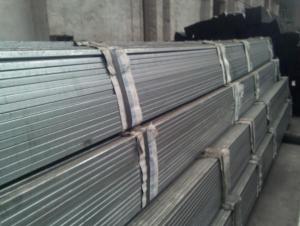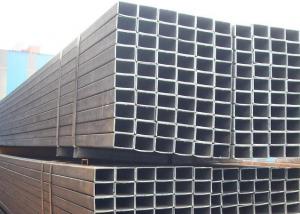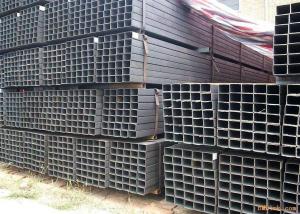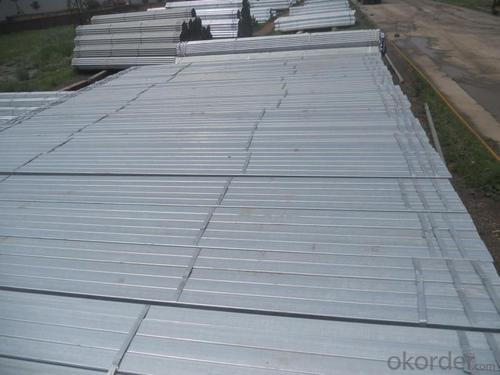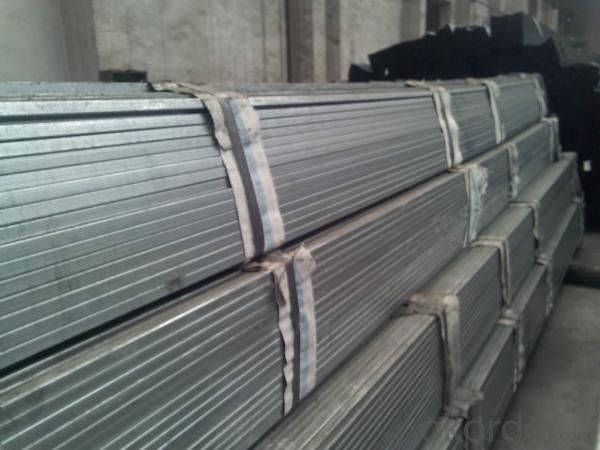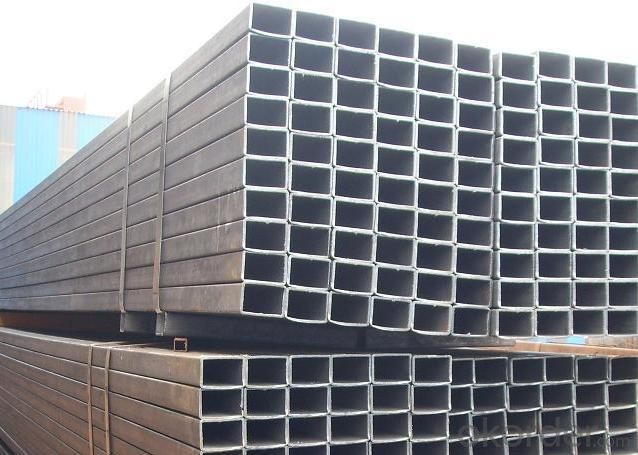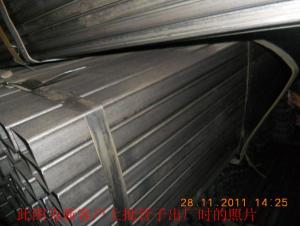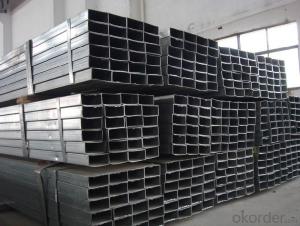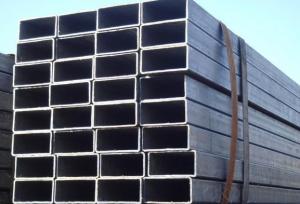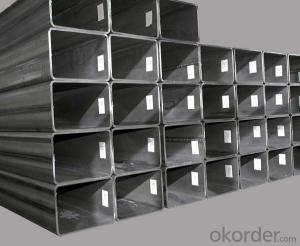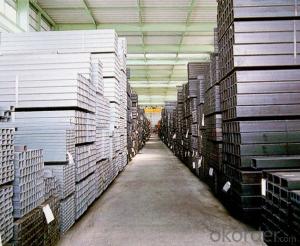High Quality Hollow Section-Rectangle Tubes
- Loading Port:
- China Main Port
- Payment Terms:
- TT or L/C
- Min Order Qty:
- 5 m.t. m.t.
- Supply Capability:
- Based On Order m.t./month
OKorder Service Pledge
OKorder Financial Service
You Might Also Like
High Quality Hollow Section-Square Tubes
Usage/Applications Of High Quality Hollow Section-Square Tubes:
It is widely used in building, machine, chemical equipment, automobile industrial, container, it is also applied to agriculture and mine machine.
Standard Of High Quality Hollow Section-Square Tubes:
ASTM A500, GB6728
Steel Grade Of High Quality Hollow Section-Square Tubes:
ASTM A500: A, B, C
GB6728:Q195,Q215,Q235,Q345
Size of High Quality High Quality Hollow Section-Square Tubes:
*Remark: Besides below sizes, we also can arrange production based on requirement of customers
|
Sizee(mm) |
Thickness(mm) |
|
20×10 |
0.6-1.0 |
|
25×12 |
0.6-1.0 |
|
38×19 |
0.6-1.5 |
|
50×25 |
0.6-1.5 |
|
50×30 |
1.6-3.0 |
|
60×40 |
1.5-3.5 |
|
75×50 |
1.5-4.0 |
|
80×40 |
1.5-4.0 |
|
100×50 |
2.0-6.0 |
|
100×60 |
2.0-6.0 |
|
100×75 |
2.0-6.0 |
|
120×60 |
3.0-6.0 |
|
120×80 |
3.0-6.0 |
|
125×50 |
3.0-6.0 |
|
125×75 |
3.0-6.0 |
|
150×50 |
3.0-6.0 |
|
150×75 |
3.0-6.0 |
|
150×100 |
4.0-12 |
|
160×80 |
4.0-6.0 |
|
175×100 |
4.0-12 |
|
200×100 |
4.0-12 |
|
200×150 |
4.0-12 |
|
250×150 |
5.0-12 |
|
300×200 |
5.0-12 |
|
400×200 |
5.0-12 |
Chemical Composition Of High Quality Hollow Section-Square Tubes (%)
|
Chemical Requirement | ||||
|
|
Composition % | |||
|
|
Grade A |
Grade B | ||
|
|
Heat |
Product |
Heat |
Product |
|
Element |
analysis |
analysis |
analysis |
analysis |
|
Carbon max |
0.26 |
0.3 |
0.22 |
0.26 |
|
Manganese max |
… |
… |
1.4 |
1.45 |
|
Phosphorus, max |
0.035 |
0.045 |
0.03 |
0.04 |
|
Sulfur max |
0.035 |
0.045 |
0.02 |
0.03 |
|
Copper, when copper steel is specified, min |
0.2 |
0.18 |
0.2 |
0.18 |
|
Where an ellipsis (...)appears in this table, there is no requirement | ||||
|
For each reduction of 0.01 percentage point below the specified maximum for carton, and increase of 0.06 percentage point above the specified maximum for manganese is permitted, up to a maximum of 1.50% by heat analysis and 1.6% by product analysis | ||||
Mechanical Properties Of High Quality Hollow Section-Square Tubes
|
Tensile Requirement | ||
|
|
Grade A |
Grade B |
|
Tensile strength, min, psi (Mpa) |
48000 (400) |
70000 (483) |
|
Yield strength, min, psi (Mpa) |
36000 (250) |
50000 (345) |
|
Elongation in 2 in. (50.8mm), min, % |
23 |
23 |
GB6728:
|
Steel Grade |
CHEMICAL COMPOSITION |
MECHANICAL PROPERTIES | ||||||
|
|
C (%) |
Si (%) |
Mn (%) |
P(%) Max |
S (%) Max |
YS(Mpa) Min |
TS(Mpa) Min |
El (%) Min |
|
Q195 |
0.06-0.012 |
0.3 |
0.25-0.5 |
0.45 |
0.5 |
195 |
315 |
22 |
|
Q215 |
0.09-0.15 |
0.3 |
0.25-0.55 |
0.45 |
0.5 |
215 |
335 |
22 |
|
Q235 |
0.12-0.22 |
0.3 |
0.3-0.7 |
0.45 |
0.45 |
235 |
375 |
20 |
|
Q345 |
0.20 |
0.55 |
1.0-1.6 |
0.45 |
0.45 |
345 |
510 |
21 |
Packaging & Delivery Of H High Quality Hollow Section-Square Tubes:
Packed in bundles, each bundle with 6-8 steel stripes and 2 nylon strips Or one by one Or Nested into Containers
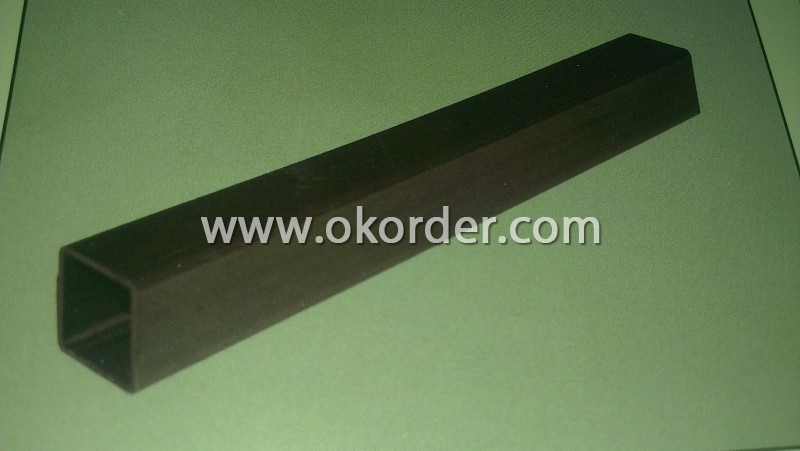
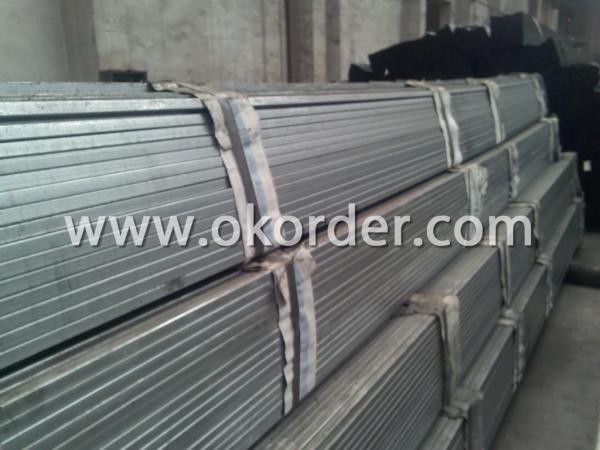
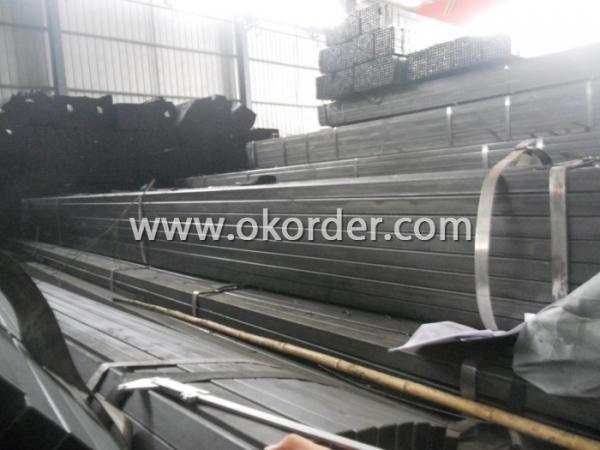
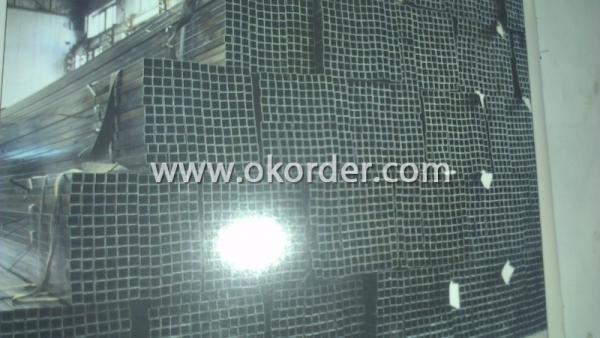
- Q: Can steel pipes be used for underground sewer systems?
- Yes, steel pipes can be used for underground sewer systems. They are commonly used due to their strength, durability, and resistance to corrosion, making them suitable for handling wastewater and underground installation.
- Q: What is the role of steel pipes in the mining and extraction of minerals?
- The mining and extraction of minerals heavily rely on steel pipes, which have a vital role to play. These pipes are extensively utilized in diverse mining operations for the transportation of fluids like water and slurry. Moreover, they are employed to offer structural reinforcement and ventilation within underground mines. A fundamental application of steel pipes in mining is the transportation of water and slurry. Water is an essential component in the mining process, serving purposes such as dust suppression, ore processing, and site rehabilitation. The creation of a pipeline network using steel pipes enables the efficient transfer of water from its source, such as a reservoir or dam, to various areas within the mine. Similarly, slurry, a mixture of crushed minerals and water, is frequently conveyed through steel pipes to processing plants or tailings dams. Structural support is another critical function fulfilled by steel pipes in underground mines. The extraction of valuable mineral deposits necessitates the construction of tunnels and shafts. To endure the immense pressure exerted by the surrounding rock and prevent collapses, these underground excavations require reinforcement. Steel pipes, acting as support structures like roof bolts and rock bolts, strengthen the walls and roofs of these tunnels and shafts, thereby ensuring miner safety and maintaining the stability of the mine structure. Furthermore, steel pipes are employed in ventilation systems within underground mines. Proper ventilation is vital for mining operations, ensuring a continuous supply of fresh air, removal of harmful gases, and control of temperature and humidity levels. Steel pipes are utilized to create ventilation shafts and ducts, facilitating the smooth flow of air throughout the mine. This aids in preventing the accumulation of toxic gases, dust, and excessive heat, thereby maintaining a safe and healthy working environment for miners. To summarize, steel pipes are indispensable for the mining and extraction of minerals. They facilitate the transportation of fluids, offer structural reinforcement in underground mines, and contribute to efficient ventilation systems. The absence of steel pipes would significantly impede the efficient and safe extraction of minerals from mines.
- Q: How are steel pipes used in the construction of offshore oil rigs?
- Steel pipes are used in the construction of offshore oil rigs primarily for the transportation of oil and gas. These pipes are used to connect the wells drilled in the seabed to the surface facilities on the rig. They are also utilized for the circulation of drilling fluids, which help maintain stability and cool down the drilling equipment. Additionally, steel pipes are used to construct the rig's structural components like risers, conductors, and caissons, providing strength and support in the harsh offshore environment.
- Q: Can steel pipes be used for underground applications?
- Yes, steel pipes can be used for underground applications. They are commonly used for various purposes such as water and sewage systems, natural gas and oil pipelines, and underground infrastructure projects. Steel pipes are durable, strong, and resistant to corrosion, making them suitable for underground environments.
- Q: How are steel pipes tested for strength and durability?
- Steel pipes are tested for strength and durability through various methods such as hydrostatic testing, non-destructive testing, and mechanical testing. Hydrostatic testing involves pressurizing the pipe with water to check for any leaks or weaknesses. Non-destructive testing techniques like ultrasonic or magnetic particle testing are used to detect any flaws or defects within the pipe. Mechanical testing involves subjecting the pipe to various loads and stresses to assess its performance and resistance to deformation. These tests ensure that steel pipes meet the required standards and are capable of withstanding the intended applications.
- Q: How do steel pipes handle water erosion?
- Steel pipes are highly resistant to water erosion due to their inherent strength and durability. The smooth surface of steel pipes minimizes friction and turbulence, reducing the likelihood of erosion. Additionally, steel pipes can be coated with protective layers, such as galvanization or epoxy, that further enhance their resistance to water erosion.
- Q: Can steel pipes be used for stormwater management systems?
- Yes, steel pipes can be used for stormwater management systems. Steel pipes are a commonly used material for stormwater management due to their durability, strength, and resistance to corrosion. They can effectively carry and transport stormwater, making them suitable for various applications in stormwater management systems.
- Q: What is the abrasion resistance of steel pipes?
- Steel pipes have a relatively high resistance to abrasion. They possess exceptional strength and durability, rendering them resilient against the detrimental effects of friction and impact. This quality positions steel pipes as a prime option for various industries and applications that frequently encounter abrasion, such as mining, oil and gas, and the transportation of abrasive substances. Furthermore, steel pipes can be fortified with coatings or linings to enhance their resistance against abrasion, tailored to meet the unique demands of each application. In conclusion, steel pipes present a dependable and enduring solution for effectively managing abrasive materials and environments.
- Q: Can steel pipes be used for oil transportation?
- Indeed, steel pipes find application in the transportation of oil. In the oil and gas industry, steel pipes are widely utilized to transport crude oil, petroleum products, and natural gas. The reason behind their popularity lies in their robustness, endurance, and resistance to corrosion. Steel pipes possess the capability to endure high-pressure conditions, making them suitable for both onshore and offshore oil transportation. Moreover, by welding steel pipes together, extensive pipelines can be constructed, thereby providing a cost-efficient method to transport oil across long distances. In conclusion, steel pipes serve as a dependable and effective option for oil transportation.
- Q: What are the advantages of using steel pipes in the manufacturing of furniture?
- Using steel pipes in the manufacturing of furniture offers several advantages. Firstly, steel pipes are known for their strong and durable nature, providing furniture with the necessary strength and stability. Additionally, steel pipes have a high load-bearing capacity, making them suitable for supporting heavy furniture items. Furthermore, steel pipes are resistant to rust and corrosion, ensuring the longevity of the furniture. Lastly, steel pipes can be easily shaped and welded, allowing for versatile and customizable furniture designs.
1. Manufacturer Overview
| Location | Hebei, China |
| Year Established | 1988 |
| Annual Output Value | Above One Hundred Million RMB |
| Main Markets | Main land; Southeast Asia; Middle East; Africa |
| Company Certifications | ISO 9002:2010;API 5L |
2. Manufacturer Certificates
| a) Certification Name | |
| Range | |
| Reference | |
| Validity Period |
3. Manufacturer Capability
| a) Trade Capacity | |
| Nearest Port | Tianjin |
| Export Percentage | 30%-50% |
| No.of Employees in Trade Department | 201-500 People |
| Language Spoken: | English; Chinese |
| b) Factory Information | |
| Factory Size: | 50,000 square meters |
| No. of Production Lines | Above 15 |
| Contract Manufacturing | Meicai Metal Trading Co.Ltd |
| Product Price Range | Average |
Send your message to us
High Quality Hollow Section-Rectangle Tubes
- Loading Port:
- China Main Port
- Payment Terms:
- TT or L/C
- Min Order Qty:
- 5 m.t. m.t.
- Supply Capability:
- Based On Order m.t./month
OKorder Service Pledge
OKorder Financial Service
Similar products
Hot products
Hot Searches
Related keywords

